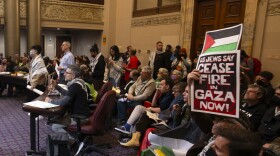DEBORAH AMOS, Host:
We turn now to NPR's Jim Zarroli, who's been listening to Federal Reserve Chairman Ben Bernanke testifying on Congress - testifying to Congress early this morning. Jim, what did the Fed chief say about the economy? Stock prices fell today. Was it something that he said when he was testifying on Capitol Hill?
JIM ZARROLI: Yeah, it seems to me it just a solidly gloomious(ph) assessment of the economy, less ambiguous than Fed chairmen usually are. You know, he talked at length about all to the problems we already know about. He said there are numerous difficulties facing the economy: falling house prices, rising energy costs, banks getting afraid to lend. He also made clear that Fed officials think things aren't going to get much better this year, or even any time, you know, soon after that. Here's what he said.
BEN BERNANKE: Growth is projected to pick up gradually over the next two years, as residential construction bottoms out and begins a slow recovery and as credit conditions gradually improve.
ZARROLI: I think what he's saying there is, you know, if you thought this slow down was going to end within a few months the way a lot of people used to think, they should think again.
AMOS: We had kind of a double-barrel approach today. You had the president on one hand, who was very public and exuding confidence. And then you have Ben Bernanke on Capitol Hill. Does it - do they cancel each other out when both of them are speaking publicly, one positive, one negative?
ZARROLI: I - that's a good question. I think that a lot of people kind of expect that the president is going to be upbeat about the economy. I mean, that's his function. And if he's anything but upbeat about it, it's going to send the financial markets tanking. Maybe it's also kind of in the personality of this particular president. You know, you look for kind of a more - a different kind of assessment from Ben Bernanke, who's the Fed chairman.
AMOS: Sure. And I understand that he also talked about inflation. Explain what his concerns are.
ZARROLI: Well, this might have been what got the stock market as upset as it did. We saw the Dow fall when he began speaking, although it regained some ground. He said, you know, inflation is high. He said it's probably going to get worse. Food and energy prices are rising. In fact, he said, you know, at some point, inflation keeps rising, and then people start to expect it. They start demanding higher and higher salaries to keep pace with prices, and, you know, that's when inflation gets embedded in the system the way it was in the 1970's, as we both remember. He said the Fed, you know, has a critical responsibility to keep that from happening, meaning, you know, that's when we have to start raising interest rates in a way that people will find painful. Now the Fed has just ended this long period of cutting interest rates. It really hasn't had the time fully work yet. So to turn around and begin talking about raising rates, well, that's just going to get the markets - that's exactly what the markets don't like to hear.
AMOS: Let's talk about the thing that is on everybody's mind, and that is the Federal Reserve is involved with the Bush administration's new plan to rescue Fannie Mae and Freddie Mac, the giant mortgage companies. How much did he talk about this when he was testifying in Congress today?
ZARROLI: He talked about it, saying, you know, basically, nothing more than regulators have been saying, that - you know, which is this is necessary because of the importance of the companies to the housing business and the economy. You know, I think even the biggest critics of Fannie Mae and Freddie Mac - and there are a lot of them, especially in the Republican Party - are now saying, you know, that - well, the government has to do something. You know, they didn't want these organizations to get as big as they are, but, you know, now that they are, they can't be allowed to fail.
AMOS: Yeah. At this point, they're too big to fail. And that was the message this morning. Correct?
ZARROLI: Right. Exactly.
AMOS: Thank you very much. That's NPR's Jim Zarroli. He's talking about testimony this morning on Capitol Hill with the Federal Reserve Chief, Ben Bernanke. Transcript provided by NPR, Copyright NPR.
NPR transcripts are created on a rush deadline by an NPR contractor. This text may not be in its final form and may be updated or revised in the future. Accuracy and availability may vary. The authoritative record of NPR’s programming is the audio record.





